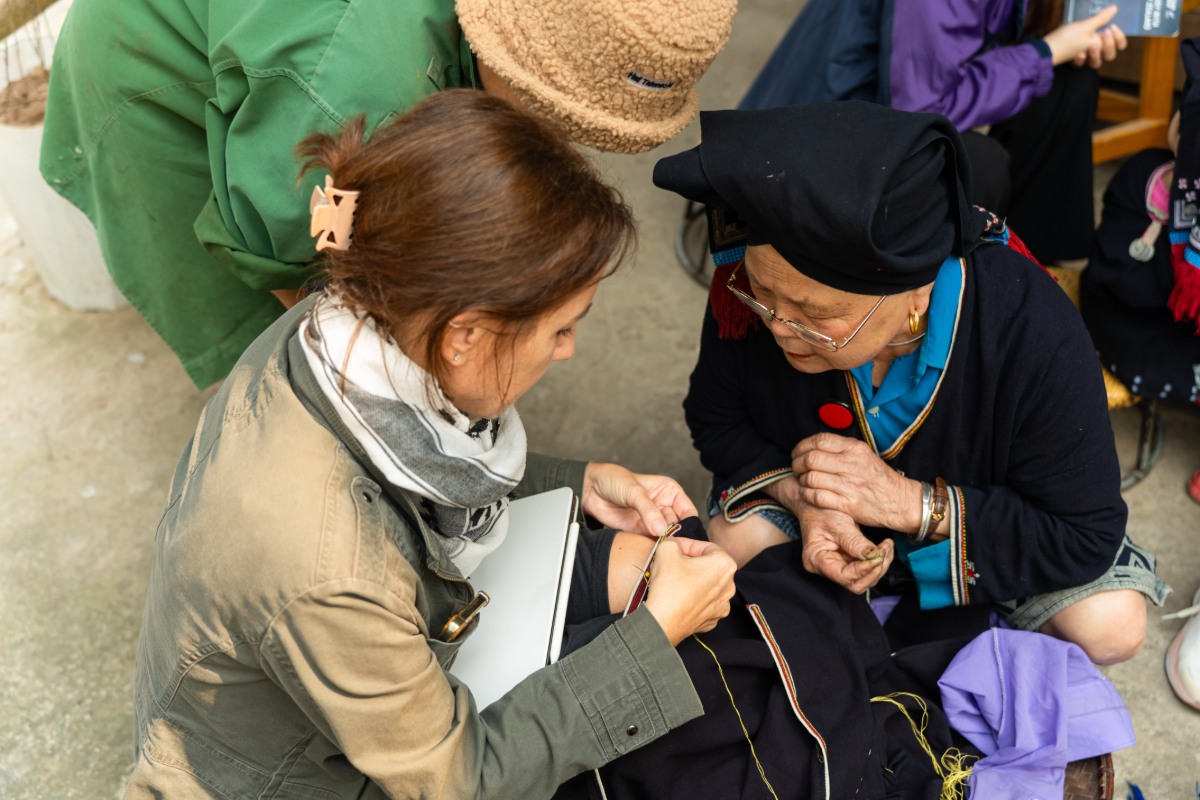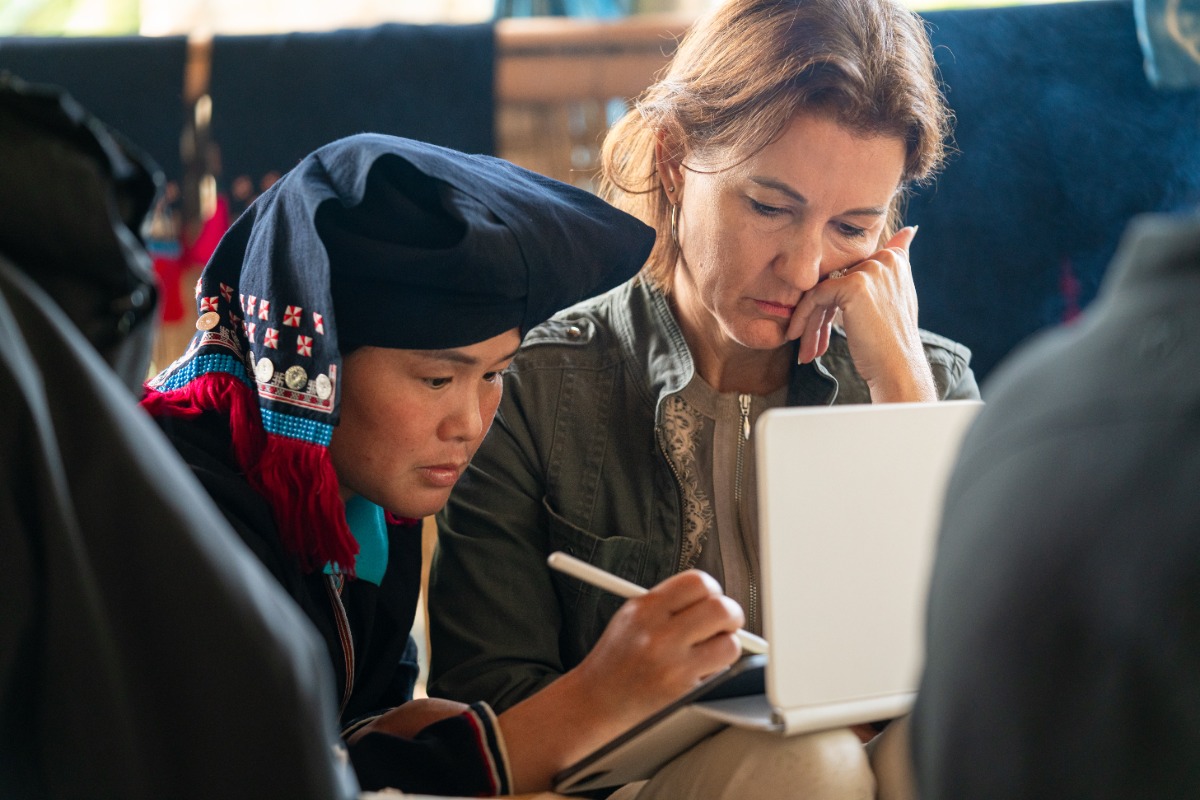
RMIT Vietnam will become the official host of the 28th Annual Conference of the International Foundation of Fashion Technology Institutes (IFFTI), to be held from 13 to 17 April 2026 at its Saigon South campus. This historic milestone marks the first time an institution based in Vietnam has been selected to host one of the most influential international conferences in fashion and textile education.
 IFFTI 2026 is seen as a powerful opportunity to spotlight Vietnam’s evolving role in sustainable and culturally rooted fashion education. (Photo: Embroidery work of Ms Ly Thi Phuong, Dao Tien ethnic group - Vietnam Design Research Studio)
IFFTI 2026 is seen as a powerful opportunity to spotlight Vietnam’s evolving role in sustainable and culturally rooted fashion education. (Photo: Embroidery work of Ms Ly Thi Phuong, Dao Tien ethnic group - Vietnam Design Research Studio)
Centred on the theme “Cultural Connections for Sustainable Fashion Futures: Rebuild, Renew, Regenerate,” the conference will invite global thought leaders, researchers, designers, educators, and students to examine how cultural heritage and indigenous knowledge can inform urgent solutions to the sustainability challenges facing the fashion industry. Presentations will span academic research and creative practice, with keynote panels offering space for critical exchange, and workshops inviting participants into hands-on, immersive dialogue on design, education, technology and community-led regeneration.
IFFTI was first conceived in 1998 and formally registered in 1999 as a global network of leading institutions committed to advancing fashion education and innovation. Today, the network includes more than 50 member institutions from 23 countries, offering a platform to share knowledge, build intercultural understanding and shape a more inclusive, responsible future for fashion.
According to Ms Corinna Joyce, Program Manager of Fashion Enterprise, School of Communication and Design – RMIT Vietnam, and Project Lead for IFFTI Annual Conference 2026, this conference is a rare opportunity to spotlight Vietnam’s growing role in the regional and global fashion landscape.
“Hosting IFFTI at RMIT Vietnam reflects our deep commitment to sustainability, cultural exchange and educational innovation,” she said.
“We are looking forward to welcoming voices from across disciplines and geographies, especially those exploring unconventional, community-based, and regenerative approaches to fashion.”
 "We’re excited to welcome unconventional, regenerative and community-based approaches to fashion," says Corinna Joyce (right), Project Lead for IFFTI 2026. (Photo: Vietnam Design Research Studio)
"We’re excited to welcome unconventional, regenerative and community-based approaches to fashion," says Corinna Joyce (right), Project Lead for IFFTI 2026. (Photo: Vietnam Design Research Studio)
As part of the upcoming program, an international audio-visual student competition will open in January 2026, inviting works across film, animation and experimental formats. Alongside the formal sessions, the conference will also foster informal networking opportunities and promote interdisciplinary dialogue between academic researchers and industry professionals.
The organising team is now welcoming contributions from scholars, educators, and creative practitioners in the field of fashion and textiles. Abstract proposals are due by 1 July 2025, with full papers to be submitted by 18 November 2025. Conference registration is expected to open in September, and the full agenda will be published ahead of the event in April 2026.
IFFTI 2026 arrives at a time when the global fashion landscape is grappling with urgent questions around ethics, ecology, and identity. This conference aims to convene a diverse range of voices and practices to rethink what sustainable design can look like when grounded in cultural understanding, community values, and regenerative futures.
For full submission details, including abstract guidelines, formatting templates, and eligibility criteria, please visit this link. All submissions must be made online. Enquiries can be directed to the Organising Committee at iffti@rmit.edu.vn.
Story: Quan Dinh H.
Masthead image: Brocade weaving work of Thai people, Hoa Tien Village, Nghe An - Vietnam Design Research Studio
Thumbnail image: Embroidery work of Ms Ly Thi Phuong, Dao Tien ethnic group, Sung Village, Hoa Binh Province - Vietnam Design Research Studio
RMIT University Vietnam students started 2026 strong with top honours at major creative competitions in Singapore and the UK, once again spotlighting the strength of Vietnamese creativity on the world stage.
The explosive growth of affiliate marketing across social media and e-commerce platforms is exposing significant legal and ethical risks, according to experts from RMIT Vietnam.
Amid the growing global demand for healing tourism, Vietnam is presented with a historic opportunity to position its national image and leverage soft power through wellness tourism.
From viral AI-generated remixes getting millions of views on TikTok to intensifying copyright battles, the music industry stands at a crossroads: Are we witnessing the dawn of a new creative era, or the twilight of human authenticity?